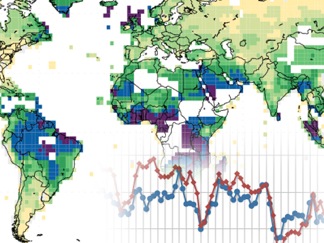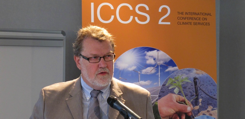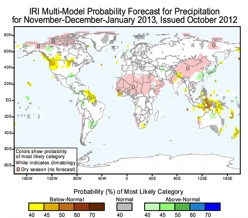If you're having trouble seeing international characters or other parts of this html page, click here to view online.

Sure, IRI's seasonal forecast says there's a 60 percent chance of above normal rain. But what does that really mean, and more importantly, can you trust it? IRI's scientists hope to make those answers clearer with a publicly available forecast verification metrics. Read more.

An Earth Institute panel on Oct. 29 will explore how science is enhancing society’s ability to understand and manage the impacts of climate variability and change. We will look at predictions, projections, tools and programs from disasters relief, agricultural and urban perspectives, as well as investigate what stakeholders can do to improve the process of using science to influence decisions. Register for the event.
A Global Conversation

Advancing International Climate Services

Join us on Twitter and Facebook! 
![]()

IN THE SCIENCE PRESS

Decadal prediction - our ability to predict the climate up to 10 years into the future - has important scientific and societal implications. Governments can use the information for better planning on agriculture, water and energy development, for example. Unlike climate change projections, the science of decadal climate prediction is still considered experimental, and little is known about its skill. A team of more than two dozen climate scientists, led by IRI's Lisa Goddard, hopes to advance the young field forward by laying out a sound framework for verifying and evaluating the skill of decadal predictions. They describe the approach in a recent paper in the journal Climate Dynamics.

IRI IN THE NEWS
Forecasts Call for Weak-to-Nonexistent El Nino This Winter. (Climate Central) view
Dire Warnings Issued on Diminishing Arctic Ice. (Voice of America) view
Hurricane season outlook, second half, and the latest on Nadine. (The Washington Post) view
CURRENT SEASONAL RAINFALL FORECAST

The International Research Institute for Climate and Society was established as a cooperative agreement between
the U.S. National Oceanic and Atmospheric Administration's Climate Program Office and Columbia University.
It is part of The Earth Institute, Columbia University.